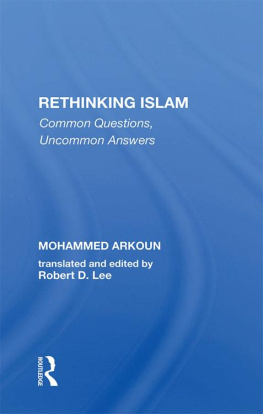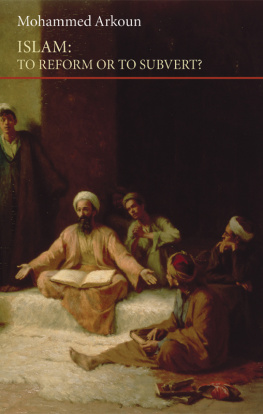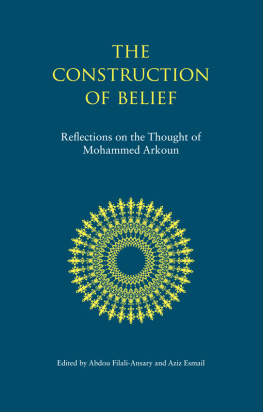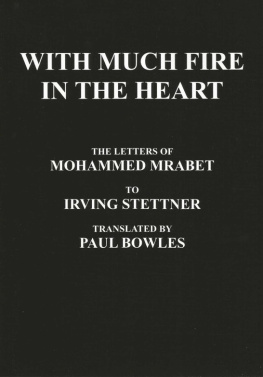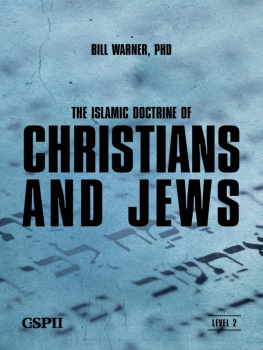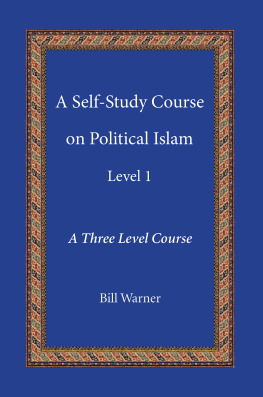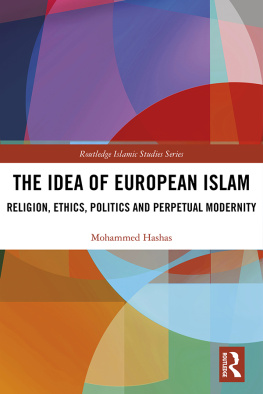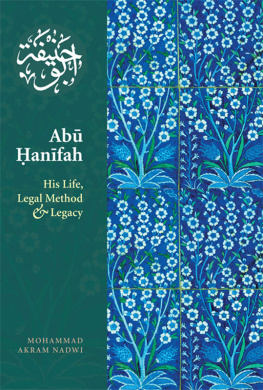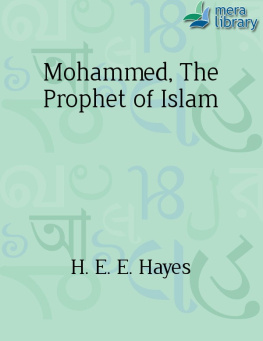Mohammed Arkoun - Rethinking Islam
Here you can read online Mohammed Arkoun - Rethinking Islam full text of the book (entire story) in english for free. Download pdf and epub, get meaning, cover and reviews about this ebook. year: 2019, publisher: Taylor and Francis, genre: Religion. Description of the work, (preface) as well as reviews are available. Best literature library LitArk.com created for fans of good reading and offers a wide selection of genres:
Romance novel
Science fiction
Adventure
Detective
Science
History
Home and family
Prose
Art
Politics
Computer
Non-fiction
Religion
Business
Children
Humor
Choose a favorite category and find really read worthwhile books. Enjoy immersion in the world of imagination, feel the emotions of the characters or learn something new for yourself, make an fascinating discovery.
- Book:Rethinking Islam
- Author:
- Publisher:Taylor and Francis
- Genre:
- Year:2019
- Rating:5 / 5
- Favourites:Add to favourites
- Your mark:
- 100
- 1
- 2
- 3
- 4
- 5
Rethinking Islam: summary, description and annotation
We offer to read an annotation, description, summary or preface (depends on what the author of the book "Rethinking Islam" wrote himself). If you haven't found the necessary information about the book — write in the comments, we will try to find it.
Rethinking Islam — read online for free the complete book (whole text) full work
Below is the text of the book, divided by pages. System saving the place of the last page read, allows you to conveniently read the book "Rethinking Islam" online for free, without having to search again every time where you left off. Put a bookmark, and you can go to the page where you finished reading at any time.
Font size:
Interval:
Bookmark:
Rethinking Islam
Common Questions, Uncommon Answers
Mohammed Arkoun
translated and edited by
Robert D. Lee

First published 1994 by Westview Press, Inc.
Published 2019 by Routledge
52 Vanderbilt Avenue, New York, NY 10017
2 Park Square, Milton Park, Abingdon, Oxon OX14 4RN
Routledge is an imprint of the Taylor & Francis Group, an informa business
Copyright 1994 Taylor & Francis
All rights reserved. No part of this book may be reprinted or reproduced or utilised in any form or by any electronic, mechanical, or other means, now known or hereafter invented, including photocopying and recording, or in any information storage or retrieval system, without permission in writing from the publishers.
Notice:
Product or corporate names may be trademarks or registered trademarks, and are used only for identification and explanation without intent to infringe.
Library of Congress Cataloging-in-Publication Data
Arkoun, Mohammed.
[Ouvertures sur lIslam, English]
Rethinking Islam: common questions, uncommon answers /
Mohammed Arkoun; translated and edited by Robert D. Lee
p. cm.
Includes bibliographical references.
ISBN 0-8133-8474-5 ISBN 0-8133-2294-4 (pbk.)
1. Islam20th century. I. Title.
BP163.A69613 1994
297dc20 94-2485
CIP
ISBN 13: 978-0-367-28590-6 (hbk)
C hange has often swept in from the marches to overtake the center of the Islamic world. Islam first took root in Arabia on the periphery of two civilizations, the Roman, which dominated the Mediterranean area, and the Sassanian, which controlled lands to the east from its capital in Iraq. Arabs and Arabic prevailed in the new Islamic state, yet the development of Islamic civilization depended upon the contributions of non-Arabs and non-Muslims from the North and especially the East. Repeated waves of invaders drove across the Oxus River from central Asia to shake, destroy, and renew Islamic culture. The Ottoman state arose in the thirteenth century on the frontiers separating Islam from the Christian world, defended by the Byzantine Empire. And the most marginal of Islamic states, Spain, produced some of the most distinguished thinking and artistic activity of its age.
In the medieval era Muslims ruled the core of the Western world, the Mediterranean basin. Medieval Islamic cultures had absorbed innovation into the tradition, which came to include important elements of Greek medicine and philosophy, Persian literature, and Eastern mysticism. The onslaught of Western Crusaders, far from shaking the confidence of Muslims, merely reaffirmed their convictions of superiority and centrality. Centuries later, at the turn of the nineteenth century, Ottoman statesmen still believed that their society could exploit the strengths of the European world, such as industrial production of military weapons and experimental science, without compromising the integrity of their political, social, and cultural systems. To them, Europe remained marginal.
Then the periphery became the center, and the Islamic world found itself marginalized by European imperialism and universalism. Imperialism brought British and French troops, administrators, and merchants to the Middle East and imposed varying degrees of political, economic, and social subordination on the area. That process reached an apogee at Versailles after World War I, when the victors took it upon themselves to dismantle the defeated Ottoman Empire and establish a system of mandates for the governance of the Middle East. No Middle Easterner participated in the decisions. Faisal ibn Husayn, who attempted to attend on behalf of "the Arab State" the allies had promised to create, found himself shunted from one train to another and then from waiting room to waiting room. He languished on the margins, as did the entire Muslim world.
European universalism, while perhaps less visible than imperialism, was even more destructive to the Muslim world. Many parts of that world began to recover from imperialism in the period between the two wars, and by the end of World War II, independence broke out everywhere. The heightened importance of Middle Eastern oil, coupled with fresh discoveries in the 1950s and 1960s, provided a measure of economic autonomy enabling a few predominantly Muslim countries to reinforce their newly acquired political independence, but cultural dependence on Europe scarcely diminished. Although European liberalism had fallen into disfavor for its associations with European imperialism, European science, technology, and ideologiessuch as nationalism, developmentalism, and Marxismcarried the day. Muslim elites espousing European ideas shoved the Islamic tradition to the margins of an otherwise marginalized world.
Mohammed Arkoun grew up on the fringes of the Arab, Islamic, and European worlds. He was born into a humble Berber family in the hillside village of Taourirt-Mimoun in the Kabylia, the so-called tribal region of Algeria. His family lived in the lower strata of the hillside village, both physically and socially; Taourirt-Mimoun itself was situated on the margins of successive dominant cultures and political configurations in Algeria, a country far removed from the heartland of Arabism and Islam. A native Berber speaker, Arkoun learned French as a second language, then Arabic as a third. A product of French schools and the French university system, he went on to teach Islamic history and philosophy at the Sorbonne. Having extracted himself from the outer reaches of Algerian society, he positioned himself at the edge of French academic life, then broadened his range of activity to Europe, America, Africa, and Asia.
Arkoun eschewed close association with the world of Western Orientalism, a discipline often linked to the European will to demean and dominate the Islamic world, but he also sought to avoid the clutches of nationalistic regimes all too eager to impose political and religious orthodoxy and to place restrictions on thought. He pushed to the very frontiers of Western social science in an effort to free Islam not just from Western misperceptions and misconceptions but also from the grips of many of its most fervent advocates. In so doing, he put himself on the cutting edge of Islamic discourse, or beyond it.
In the world Arkoun proposes, there would be no margins and no center, no marginalized groups and no dominant ones, no inferior beliefs and no superior, truth-producing logic. He seeks a response to what may be the critical political question of our time: How can people be thoroughly themselves without isolating themselves, by virtue of this identity, from their neighbors and the rest of humanity? He poses it for Muslims, in particular: Can the various Muslim identities be reconciled with each other and with non-Muslim identities, or does the contemporary reassertion of cultural identities mean the world is necessarily divided between Shi'is and Sunnis, mystics and traditionalists, Muslims and Christians, Berbers and Arabs, North Africans and Europeans? The implications of Arkoun's responses reach far beyond the world of Islam.
Events in Yugoslavia and the former Soviet Union in the early 1990s remind us that problems of identity are not limited to the Middle East, Africa, and South Asia. Indeed, is there any country where problems of multiple identities have been thoroughly and permanently resolved? Canada, the United States, and Great Britain would all have difficulty making such a claim. But the clash between cultural identities and political order, both national and international, has been sharpest in the Third World and in predominantly Muslim countries. The reasons lie embedded in the history of Islam and in the history of the West. Arkoun would have us understand those histories as a means toward reconciling the universal with the particular, the oneness of human experience with the diversity of beliefs and identities that constitute the modern world.
Next pageFont size:
Interval:
Bookmark:
Similar books «Rethinking Islam»
Look at similar books to Rethinking Islam. We have selected literature similar in name and meaning in the hope of providing readers with more options to find new, interesting, not yet read works.
Discussion, reviews of the book Rethinking Islam and just readers' own opinions. Leave your comments, write what you think about the work, its meaning or the main characters. Specify what exactly you liked and what you didn't like, and why you think so.

